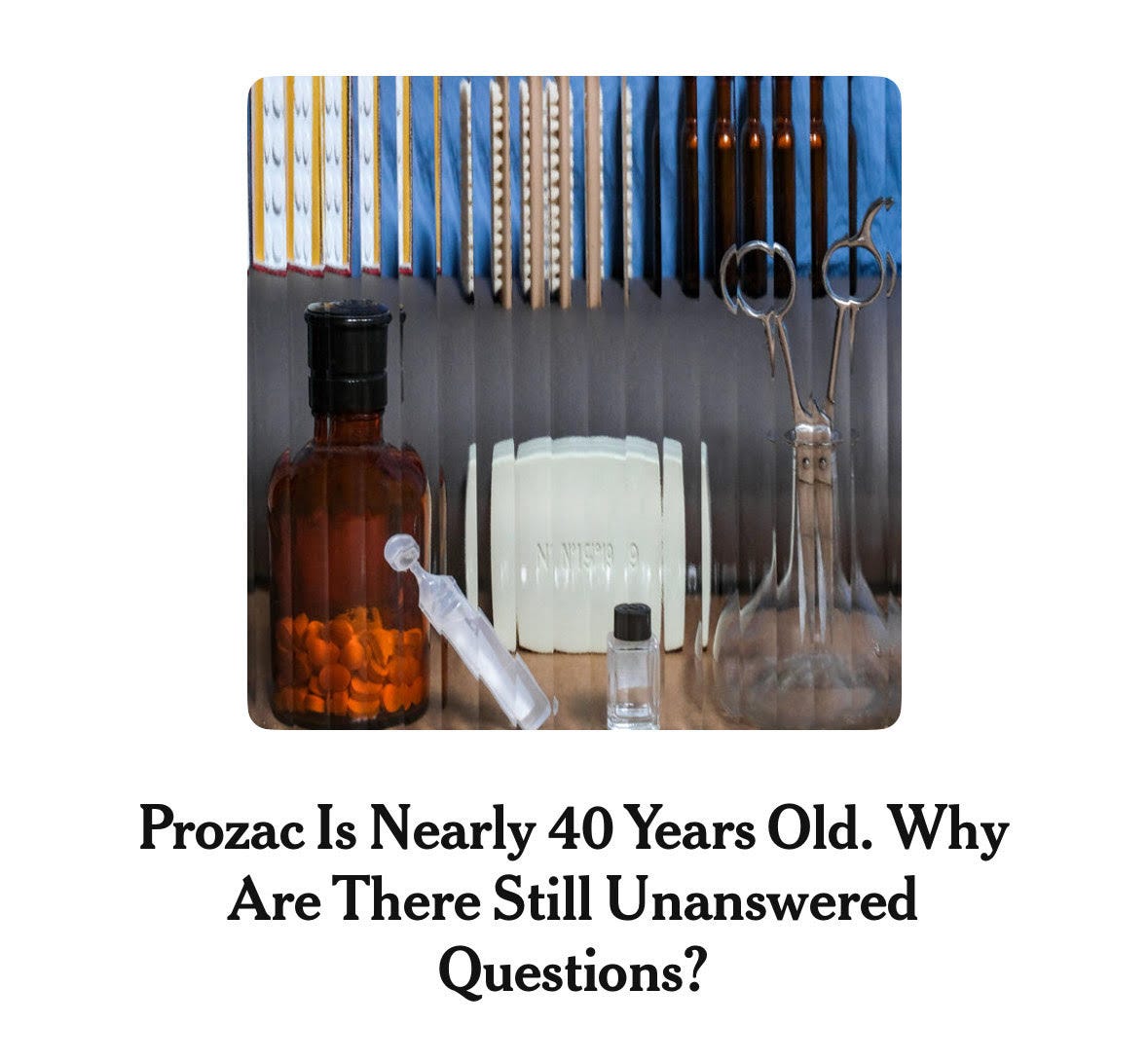When It Comes to SSRIs, Are Our Only Choices “Safe & Effective” or “More Dangerous Than Heroin”?
My New York Times op-ed and bonus content
In an Opinion guest essay for the New York Times (May 3, 2025) — titled variously as “Prozac Is Nearly 40 Years Old. Why Are There Still Unanswered Questions?” “Harm From Antidepressants Is Real. Let’s Not Cede the Conversation to Kennedy,” and “What Kennedy Gets Right, and Wrong, About Antidepressants.” — I discuss how clinical neglect of medication-related harms has made RFK Jr.’s stance on antidepressants appealing to so many, and that moving the public conversation in a productive direction requires us to remedy this neglect.
Nothing in my article would be a surprise to those who have been active in or kept up with debates around antidepressant withdrawal or iatrogenic harm in recent years, and my goal wasn’t really to say something particularly new or innovative. The goal was rather to say something sensible, something clear-headed, amidst increasingly chaotic and polarizing public discourse, ideally something that would also serve as a call to action for the medical profession.
You can read the article using this gift link.
Here’s the crux of the essay in these passages:
“The public deserves advice about psychiatric medications that does not oscillate between stupor and alarmism. Antidepressants, like all medical interventions, come with benefits and trade-offs. If psychiatry refuses to engage seriously with patients’ concerns, if the mantra of “safe and effective” is all it is willing to publicly say, it will lose credibility. We cannot disregard those whose lives have been derailed by psychiatric medications.
This political era has revealed that the aggrieved would rather burn the system to the ground than put up with an establishment that does not speak to their everyday realities. The question is whether the medical establishment will meet that demand with humility and scientific transparency — or leave the conversation to those willing to exploit the suffering of vulnerable individuals for their personal and political gain.”
A shout-out and thanks to my NYT editor, Alex Ellerbeck. The published piece owes a lot to her keen editorial input.
I’ll use the rest of this post to share some additional details, background info, and qualifications that didn’t make it into the published article.
In his confirmation hearing in January 2025, RFK Jr. made various controversial claims about antidepressants, but one in particular captured the attention of people: “I know people, including members of my family, who’ve had a much worse time getting off of SSRIs than they have getting off of heroin.” RFK Jr. did not come up with this analogy himself. In online communities of people who have experienced harm from prescribed psychiatric medications, such as the forum “Surviving Antidepressants,” the comparison between heroin (and other drugs of abuse) and antidepressants has existed for quite some time. We find remarks such as “… coming off of heroin was easier than coming off of Prozac. How crazy is that?!” [July 2024] and “Coming off Venlafaxine is no different to coming off Cocaine, Heroin or Methamphetamine. It’s terribly difficult and puts a huge strain on our bodies. Even when micro tapering, I came undone.” [Aug 2024] It is no surprise then that RFK’s remarks resonated with so many in the prescribed harm space: “I don't like what the guy is saying, but he's made one true statement - SSRI withdrawal *can* feel as bad as getting off heroin. The stories on this forum are proof of this,” a commentator [February 18, 2025] posted on Surviving Antidepressants. I have to be clear, none of this amounts to an actual empirical demonstration that getting off SSRIs is harder than getting off heroin. What it does show is that antidepressant withdrawal can be so difficult for some people that they reach for a comparison to heroin in order to convey that.
Cooper Davis, Executive Director of Inner Compass Initiative, who I interviewed recently on this substack, posted on X (Twitter) during RFK Jr.’s confirmation hearing: “… he might be the only person in the room who gets how serious it can be.”
In 2018, the New York Times reported on the difficulties of patients on antidepressants who were experiencing severe withdrawal issues in their efforts to come off them. Nearly 40 psychiatrists affiliated with Columbia and Weil Cornell responded in a letter to the editor, claiming, “To practicing psychiatrists and the vast majority of patients, withdrawal is low on the list of priorities.” Withdrawal may indeed be a low priority for the vast majority, but this is of no consolation to the minority who do experience severe withdrawal and who struggle to get adequate help from clinicians who are dismissive of their difficulties. This attitude extends to other serious harms as well. One prominent psychiatrist has claimed that persisting sexual dysfunction after SSRI use is “depression recurring until proven otherwise,” illustrating what sufferers of post-SSRI sexual dysfunction had been saying for years: that they are disbelieved by their providers and their sexual problems dismissed as a consequence of depression.
The patients I work with who experience a variety of complications with antidepressants are ordinary people with no hostility towards psychiatry and no axe to grind. They are generally desperate for symptom relief, and even after negative experiences with one or more antidepressants, they often remain eager to find a psychiatric medication that does work for them, and with cautious trial and error, many of them do.
I write in the op-ed, “Of those who try to quit, conservative estimates suggest about one in six experiences antidepressant withdrawal, with around one in 35 having more severe symptoms.” These are highly conservative estimates on the lower end, obtained by subtracting nonspecific placebo/nocebo effects (people in placebo groups who experience withdrawal). Others report figures in the 30-50% range for incidence of antidepressant withdrawal.
“Antidepressants” are used clinically not just in the treatment of depression but in a wide range of conditions, such as anxiety disorders, obsessive-compulsive disorder, post-traumatic stress disorder, anorexia, etc. This is important to keep in mind any time we talk about how many people are on SSRIs/SNRIs.
Stories of antidepressant withdrawal have reached a critical mass such that they can no longer be denied, yet it does not mean that medical science has caught up. The widely respected Canadian Network for Mood and Anxiety Treatments (CANMAT) guidelines in 2023 reported insufficient evidence to make a recommendation regarding the appropriate tapering method for antidepressants.
Rather than allowing the conversation to be dominated by problematic dichotomies, we can ask what a responsible and informed approach to psychiatric medications should look like. The goal is not to demonize antidepressants, and we can acknowledge their risks with the same level of seriousness as we acknowledge their benefits. It means recognizing that while many patients benefit from these medications, some are seriously harmed by them in ways that medicine has been slow to study, validate, or adequately address. It also means rejecting the notion that medical inquiry into these harms must be ceded to fringe movements rather than rigorously pursued using clinical research so that disagreements can be resolved and a scientific consensus can be achieved.
It seems quite likely that the MAHA commission will conduct a review of the “threats” of psychiatric medications without taking into account the clinical complexities and the presence of genuine distress and disability that lead people to use these medications. Psychiatric medications are being used because there is a legitimate clinical need. The response should not be to restrict access to medication by pretending their use is unnecessary, but rather, the goal should be to make research into iatrogenic harm a funding priority for research, increase access to high-quality clinical care that goes beyond reliance on medications, improve public health services, and better understand and convey the magnitude of risks involved in long-term treatment so that clinicians and patients can make informed decisions.
A physician commented on social media in response to my article, “If one person becomes reluctant to seek care because of your article, how would you feel?” I find this kind of mindset to be irksome and infuriating. I believe that patients deserve to make decisions based on an accurate understanding of the risks involved. We cannot withhold information and give the public a false sense of safety based on concerns that some people will become unreasonably reluctant to seek care. Physicians thinking in this manner and trying to preserve eagerness to seek care at all costs has no doubt contributed to the erosion of public trust in medicine.
I want to plug a post by Thomas Reilly on Rational Psychiatry (excellent substack, consider subscribing), which was on my mind as I was working on the NYT article, “How deprescribing became divisive”:
“Deprescribing is an essential skill for all prescribers and has to become part of mainstream psychiatry… we can’t leave deprescribing to the Joanna-Moncrieff-wing of psychiatry. There are dangers in this issue being owned by people who don’t think psychiatric medications have any benefit beyond a kind of temporary numbing of problems. Deprescribing shouldn’t be done in specialist clinics by doctors who are skeptical that medication does any good for anyone - it should be the bread and butter of every working psychiatrist. We need deprescribers to recognise that, for some patients (especially those with recurrent or severe episodes) the benefits of continuing medication may outweigh the benefits of stopping.”
Reilly is absolutely correct here. By not taking ownership of deprescribing and iatrogenic harm, mainstream psychiatry has unfortunately ceded this ground to contemporary skeptics of medical psychiatry, ranging from Joanna Moncrieff to RFK Jr. It is not too late to take it back.
Psychiatry at the Margins is a reader-supported publication. Subscribe here.
See also:






When I was getting on SSRI's I had a bad reaction to Zoloft. It made me feel jazzed and made sleep onset difficult. Fortunately, citalopram works great for me. But that experience was enough to prove to me that these medications have different impacts on different people.
One could just as well ask psychiatrists who present an overly rosy picture this:
"If one person becomes reluctant to seek care because they hear stories from patients whose concerns were dismissed, who weren't properly informed of the risks before they tried the medication, who were then disbelieved by their doctor when they complained about serious side effects or withdrawal symptoms - HOW WOULD YOU FEEL?"
Because this totally happens.
These "rosy" psych docs live in a world of their own where psych patients never talk to each other. In a world where each psych patient has sane and neurotypical friends and acquaintances only. In a world where psych patients don't even have internet access. Therefore, you can paint a picture as rosy as you like and it will never be a problem, since YOU are your patient's only source of information. Like WTF. Maybe YOU should go to therapy and discuss how you came to develop these strange delusions.